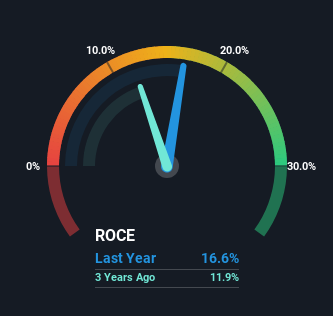- United States
- /
- Media
- /
- NYSE:IPG
Interpublic Group of Companies (NYSE:IPG) Has More To Do To Multiply In Value Going Forward
What trends should we look for it we want to identify stocks that can multiply in value over the long term? In a perfect world, we'd like to see a company investing more capital into its business and ideally the returns earned from that capital are also increasing. Put simply, these types of businesses are compounding machines, meaning they are continually reinvesting their earnings at ever-higher rates of return. However, after briefly looking over the numbers, we don't think Interpublic Group of Companies (NYSE:IPG) has the makings of a multi-bagger going forward, but let's have a look at why that may be.
Return On Capital Employed (ROCE): What Is It?
For those that aren't sure what ROCE is, it measures the amount of pre-tax profits a company can generate from the capital employed in its business. To calculate this metric for Interpublic Group of Companies, this is the formula:
Return on Capital Employed = Earnings Before Interest and Tax (EBIT) ÷ (Total Assets - Current Liabilities)
0.17 = US$1.5b ÷ (US$19b - US$10b) (Based on the trailing twelve months to December 2023).
Thus, Interpublic Group of Companies has an ROCE of 17%. On its own, that's a standard return, however it's much better than the 8.3% generated by the Media industry.
View our latest analysis for Interpublic Group of Companies

Above you can see how the current ROCE for Interpublic Group of Companies compares to its prior returns on capital, but there's only so much you can tell from the past. If you'd like, you can check out the forecasts from the analysts covering Interpublic Group of Companies for free.
What Can We Tell From Interpublic Group of Companies' ROCE Trend?
Things have been pretty stable at Interpublic Group of Companies, with its capital employed and returns on that capital staying somewhat the same for the last five years. Businesses with these traits tend to be mature and steady operations because they're past the growth phase. So don't be surprised if Interpublic Group of Companies doesn't end up being a multi-bagger in a few years time. With fewer investment opportunities, it makes sense that Interpublic Group of Companies has been paying out a decent 45% of its earnings to shareholders. Unless businesses have highly compelling growth opportunities, they'll typically return some money to shareholders.
On a side note, Interpublic Group of Companies' current liabilities are still rather high at 54% of total assets. This effectively means that suppliers (or short-term creditors) are funding a large portion of the business, so just be aware that this can introduce some elements of risk. While it's not necessarily a bad thing, it can be beneficial if this ratio is lower.
What We Can Learn From Interpublic Group of Companies' ROCE
In a nutshell, Interpublic Group of Companies has been trudging along with the same returns from the same amount of capital over the last five years. Since the stock has gained an impressive 88% over the last five years, investors must think there's better things to come. Ultimately, if the underlying trends persist, we wouldn't hold our breath on it being a multi-bagger going forward.
One more thing, we've spotted 2 warning signs facing Interpublic Group of Companies that you might find interesting.
While Interpublic Group of Companies may not currently earn the highest returns, we've compiled a list of companies that currently earn more than 25% return on equity. Check out this free list here.
New: AI Stock Screener & Alerts
Our new AI Stock Screener scans the market every day to uncover opportunities.
• Dividend Powerhouses (3%+ Yield)
• Undervalued Small Caps with Insider Buying
• High growth Tech and AI Companies
Or build your own from over 50 metrics.
Have feedback on this article? Concerned about the content? Get in touch with us directly. Alternatively, email editorial-team (at) simplywallst.com.
This article by Simply Wall St is general in nature. We provide commentary based on historical data and analyst forecasts only using an unbiased methodology and our articles are not intended to be financial advice. It does not constitute a recommendation to buy or sell any stock, and does not take account of your objectives, or your financial situation. We aim to bring you long-term focused analysis driven by fundamental data. Note that our analysis may not factor in the latest price-sensitive company announcements or qualitative material. Simply Wall St has no position in any stocks mentioned.
About NYSE:IPG
Interpublic Group of Companies
Provides advertising and marketing services worldwide.
Flawless balance sheet 6 star dividend payer.
Similar Companies
Market Insights
Weekly Picks

THE KINGDOM OF BROWN GOODS: WHY MGPI IS BEING CRUSHED BY INVENTORY & PRIMED FOR RESURRECTION


Why Vertical Aerospace (NYSE: EVTL) is Worth Possibly Over 13x its Current Price


The Quiet Giant That Became AI’s Power Grid
Recently Updated Narratives


Insiders Sell, Investors Watch: What’s Going On at PG?

Waiting for the Inevitable


Near zero debt, Japan centric focus provides future growth
Popular Narratives


MicroVision will explode future revenue by 380.37% with a vision towards success


NVDA: Expanding AI Demand Will Drive Major Data Center Investments Through 2026




